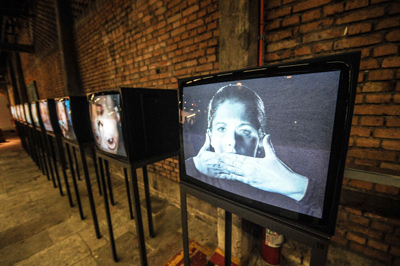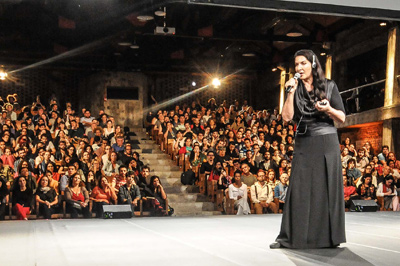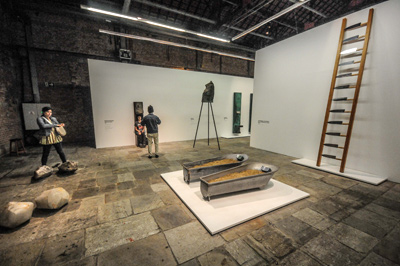[kol_2] Grenzfall: I just want to be normal. Give me chocolate.
An evening with performance artist Marina Abramovic

“Guten Abend.”
Ihr Deutsch hört sich gut an. Können wir unser Gespräch etwa in dieser lustigen Barbarensprache abhalten?
„Are you crazy?“
She laughs and offers me a cookie.

She prefers English. But still remembers lines from her German language teaching lessons.
“Der Zug hat Verspätung”, “Ich habe Zeit”, “Halt, halt ein Unfall” and “Geben Sie Ihre Papiere”.
“But my favourite sentence is one I made up myself, but I cannot really use it in conversations very much: In jeder Stadt ein Philosoph, mit eigenem Radiergummi.
I love this one.”
For over two month, Marina Abramovic, the world’s most influential performance artists, spends her days at SESC Pompeia Exhibition Centre in Sao Paulo, where her first ever retrospective exhibition in Latin America fills the audience and media with enthusiasm.
“I need a coffee, please. I am exhausted.”
Every day she wakes up around 6.30 am, she says. Now, twelve hours and two workshops later, she is getting ready for another one-hour lecture to an audience of 750 people.
“Well, actually it is a three hour lecture – I talk for an hour, then they make questions for another two hours. They never let me go, you will see.”
The audience in Sao Paulo loves her.

“Brazilians are enormously emotional and have a very strong relation to their body” she says with a smile.
“But every culture is different. The Germans are so rational, but finally, when you touch them, they are very good too….”
More laughs.
“But in the beginning, they are very suspicious about everything, they question everything.
These Germans…..”
Her work retrospective at SESC doesn`t include a new performance. But you can watch videos of her now legendary performances from over the last forty years, do your own experiments with artefacts from her past performances, participate in her workshops or do the “Method”, a two and a half hours experience to slow down life, including slow motion walking or just standing in the corner for half an hour.
“You have to put your watch, your telephone and computer in the locker, so you have free time for two and a half hours. No emails, no phone calls, no text messages, no anything. And then you are really free. I am giving you freedom, because technology makes us imprisoners.”
Every day, people queue up at SESC to do the “Method”. She calls it “brain spa.”
“One woman sold her car after attending the “Method” for over one month.”
She smiles. More cookies, and her coffee finally arrives.
“Do you mind my assistant doing the make-up while we are talking?”
“Technology was invented so that human beings have more time. But it took all the time away.”
Her eyes are closed now, as the assistant does her eyelids.
“Before that, you wrote a letter, you got it to the post office while taking the dog for a walk, put the letter in the box… And then you had another ten days before you got the answer. Now you wake up in the morning, send the email, and in the evening it is all coming back.
It is all incredible unfinished business, constantly, endless, endless….”

She sips on her coffee while her assistant refreshes the make-up on her cheeks.
“I think that it is very important that we go back to simplicity. Because technology will make us absolute invalids, it changed so fast, that the human brain can`t follow anymore. If we don`t go back to our simplicity, we are completely going to be lost. This is why artist have to look for some kind of solution, like the Method.”
“You should try that.”
Considering the strangeness of her performances (at least for me), like the one with the venomous snakes on her head and in her mouth, the one where she takes a shower in front of hundreds of people or the one where she looks at a donkey for hours, you might come to the conclusion that Marina Abramovic is somehow a strange person. Or even crazy. But this young lady seems to be a lighthouse of normality in a sea of craziness all around.
“I am very normal, actually too normal. I am almost old fashion. All my performances were to change consciousness, change the way we see things.”
While she is talking, her assistant tries to apply eyeliner. Suddenly, she burst into laughter.
“It is so funny that we are doing this – I am looking to you and she is doing my eyes. That is perfect. I like these completely crazy situations….”
The exposition at SESC has nothing to do with her age, she swears.
“I never look back, because when I think about how many different lifes I lived, I get soooo tired. I feel old, and think: what are you doing here, just go away and die.
So now I only look to the front.”
In her first performances, she simply tested the limits of her body. Now, at this certain age, she focuses on the limits of her mind.
“In the early days, I didn`t have the mental control that I gained now with old age. I learned to use the energies that our cultures don`t use.
In our materialistic, European culture we work intellectually, from the head, but we don`t use the energy of our body. But I learned to use that from the ancient cultures.
Performance is all about energy. And energy is immaterial. You have to feel it, otherwise you don`t know what is happening.”
Her telephone rings. Someone from another part of the world. She is constantly traveling, a life lived in hotel rooms, at exhibitions, biennales, airports.
“I an a nomad. But I feel so free, and that is great. I can do whatever I want. Freedom!”
Back to performances.
“Performance is serious business.”
“It is the moment that you enter in a kind of mental and physical construction, which you create in front of you and in a certain space and time. And the public is there, and then this dialogue happens, and it is unique. Because you are not working for your ordinary self, you are creating a higher self. You are working for the best of yourself.
When in ancient cultures, dancers put their mask on their face, and then they do something that is almost physically impossible to do. Because it is not their human energy, it is this transformation that takes place. The extra energy they have in the body. And this is what happens in performances. And the higher you can go depends on the public, because the energy of the public goes through you.”
Everybody can perform? Or do you have to be born a performer?
“You don`t have to be born a performer, but you have to be born to have charisma. If you stand in front of the people and do absolutely nothing, you have to have the energy to keep the people there. Otherwise just don`t do it.
My favourite charisma person was Klaus Kinski. He was so crazy. Oh my God……”
In one video performance, you can see Marina eat an onion. When I watched it before the interview, a nice lady from SESC told me that in fact Marina had to tape it three times – first, the audio wasn`t okay, and in the second take, the image was out of focus. So, she ate three onions to get it right….
Are you the same person in real life?
“No, of course not, that`s the point. In real life, if I cut myself cutting onions in the kitchen, I cry. But if I do it in front of the public, I am fine. How you explain this?
You use the energy of the public… You are the little poor me in real life, and then in performance you are not.
But as soon as I finish performance, I want ice cream. I just want to be normal. Give me chocolate.”
The make-up is ready, now she wonders how to wear her hear.
“Shall I wear it open or do a ponytail?”
Maybe just let it hang over your shoulder?
“I had the ponytail on all the other nights, so maybe you are right.”
“You cannot be extreme all the time. It is not human. I am not perfect, and I don`t want to be perfect. I mean, in my life, everybody knows everything. I never hide anything, because that`s how it is. Because that is human, I am not perfect, and the public can connect with me, because they are the same as me. So we have a connection. There is a moment when you are incredible vulnerable, broken heart and everything else. That is reality, and that`s when you really understand yourself and don`t pretend to be anything else. Then it`s good.”
She works on a book about her memories.
“When you get 70, you should have such kind of a book.”
I had to ask that one question, the one that starts with “Do you still consider yourself the grandmother of performance….”
“Oh c`mon!”
“Can we escape that part, because I invented this twenty years ago, and people still don`t have any other imagination to call me something else….
I invented this when I was young, and now I am really old and don`t want to be called grandmother any more. I hate it. Call me a warrior, fighting for the status of performance. Because performance was nobody`s territory, and now it is an official form of art.
I am doing this for forty-five years now. I will be 70 next year, and still doing it. I love doing it.”
She wears a long black dress. A shaman, or a priest, or just a dark lady with a big, open heart.
“It took me such a long time to learn all this. Right now, I am in the most happy moment of my life. I am the most balanced. I never want to be twenty anymore, it was such a mess in my head, confusions, identity… It takes such a long time to grow, to understand and accept yourself.”
I ask for a photo. Not for a selfie, of course. She hates selfies.
“It is this overdose of images, you are actually recording your life. You are not living it.”
Click, click, click.
“Now I have to eat something.”
|
|
“In the last years, art has become such a commodity, a piece from Francis Bacon sold for 145 million Dollars. You don`t see art any more. When you see the painting, you only see the money, you see that it costs 145 million Dollars. Art is loosing sense, so it is very important to go back to people.
And performance is the worst saleable thing.”
Text und Fotos: Thomas Milz
|
[druckversion ed 05/2015] / [druckversion artikel] / [archiv: grenzfall]
|